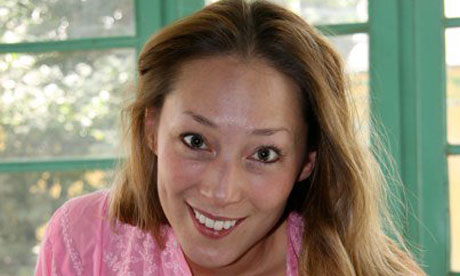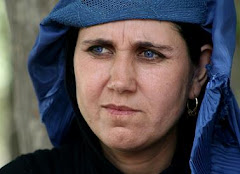
December 25, 2010
In the first person voice of Abdulai, a fifteen year old Afghan boy whose father was killed by the Taliban:
“The place where I live is the worst place on earth in which to be born . Good thing my mother survived her pregnancies . But my father -- he didn’t survive the war. Isn’t it strange that there is a graveyard marked out especially for children in my small remote mountain village? A quarter of all children do not live beyond five years of age and they are buried there; we already have to find new space because the graveyard is filled. As 42 percent of Afghans live in poverty , my family could not afford a proper grave for my father for five years. My father would have understood our predicament: in a land with the worst food risk in the world , we make do with whatever food and clean water we can get. Since we don’t have electricity , we are grateful for diesel lamps. And most importantly, my father would have understood that we still struggle to stay away from the killings.
Since War World II, wars have killed mainly civilians and this war in Afghanistan is no exception. In fact, we now have nowhere to turn and nowhere to hide . We face night raids , computerized aerial bombings and the armed players who neither recognize our language nor our faces.
Many of our families and friends have sought refuge in far-away places . What can our people do? Wait to die of sickness or violence? Be pawns in the warlords’ games? I made hand-sewn leather cell-phone peace pouches for our ‘brothers’ and ‘sisters’ in Kandahar and I know that before the NATO commander had launched the current offensive there, 94% of Kandaharis said they wanted peace talks , not war. But the US led coalition went ahead and launched its deadly military operation. They proved their utterly un-democratic, unimaginative addiction to an unchanging military solution.
Karzai said that more than 42 percent of children in Afghanistan still have no access to schooling : at least, that’s not as fatal as the three children killed daily in the conflict last year . If you don’t grasp how the Afghan state is the third most corrupt in the world , come take our school exams to experience the rampant bribery and cheating this war encourages. Like other war-torn countries, the influx of weapons and un-accounted monetary aid fosters corruption, fuelling deceit at all levels of our society.
Drugs made from poppies grown in our country are everywhere, with more than a million drug addicts in country . Perhaps, being doped is better than putting up with our sheer lack of work and recourse to government services or justice. Last year, estimates are that we Afghans had to pay $2.49 billion dollars in bribes to our own government officials , which is equivalent to 23% of our country’s GDP.
But heck it….we don’t even want your money! Two billion of which you spend on the military weekly and the remaining dirty trickle cannot even be accounted for by your Special Inspector General for Afghanistan Reconstruction (SIGAR) .
My mother and sister say to you that you can forget about promoting ‘women’s rights’ with your uniformed pride. Last year, there were 2300 suicides related to depression among women and girls . And don’t ever claim that a military strategy can stop them from taking their lives. Neither the US-NATO coalition nor our warlords can, with their violence, stop the desperation of our people. In fact, like the people caught in the Helmand operation that was declared a success, the women of Afghanistan want you, with full responsibility, to transition out as soon as possible .
President Obama, please completely rethink the ‘progress’ you declared in theThis People’s December Review sought to speak from the ‘hearts and minds’ of ordinary Afghan people, commoners who share the same pain experienced by the impoverished and unheard masses everywhere.
December review . To Ms. Hillary Clinton and Mr Robert Gates, we’re sorry for
your dismissal of world public opinion . Now, get ready for its flood!
It is a reflection of life as it really is for the people of Afghanistan.
The world should listen.
The people of the world should be listening to one another, because governments are not.
President Obama declared in his administration's December Review that there was ‘significant progress’ for America’s goals in Afghanistan.
He claimed to be ‘on track.’
But, Abdulai’s People’s December Review shows how far off-track Obama is from the people’s concerns and how U.S. foreign policy gives no alternative options for any citizen.
There ARE alternative options and views, a small number of which we’ve listed below, starting off with Prof. Noam Chomsky’s views expressed in the Afghan Youth Peace Volunteers’ recent conversation with him.
In the bigger scheme of history, for too long now, the strategies for resolving global conflicts have been built predominantly around military force.
Soul-force must be given a chance.
Excerpts of interview with Prof Noam Chomsky
In a conversation with the Afghan Youth Peace Volunteers on the 17th of December 2010 for The People’s December Review.
On Obama’s claims of ‘significant progress’
…it’s worth noting that a few days ago the International Commission of the Red Cross released a report which is extremely unusual for them, -they rarely do it,- in which they said that the situation on the ground has deteriorated radically. They gave particulars and said it’s now far worse than it’s been in the past. They’re actually working there and have experience. Plainly that’s not consistent with the picture of progress.
On self-determination by the people
I know for me at least and the people I work with in the antiwar movement the goal for Afghanistan would be for Afghans themselves to take over the planning, the determination of what will happen ,so that there won’t be a review conference in Washington where they have their own goals, --the welfare of the people of Afghanistan is not high among them,-- but rather the decisions will be made by people like you and others in Afghanistan who have the fate of your country and your lives at heart and people of the US here should support your efforts in whatever way we can.
….But there is extensive study that demonstrates that there is a very wide gap between the decisions of the government and the will of the population. That’s true on domestic issues. It’s true on international issues, and it reflects the fact that though the U.S. is an unusually free country by comparative standards, it’s only in a very limited way a functioning democracy.
Power does not lie in the hands of the population except in a very limited way and popular opinion does not determine policy. And that’s in fact one of the reasons why there’s such hysteria over the leaks of government documents. Anyone who has studied secret documents for many years, as I have, knows one of their main purposes is to protect the government from the population, not security, but just keeping the public controlled and obedient. That’s a battle that has to be constantly fought in the more free societies as well to try to overcome this dysfunctional element of formal democracy which keeps it from functioning properly. Popular movements have in the past and should in this case too integrate themselves with those of other countries and form a common force, often against their own governments.
On reparations
Afghanistan has a very dramatic, important history of independence, but for the last thirty years it has simply been a plaything of the great powers which have virtually destroyed it. All of them. All of the ones who were involved owe Afghanistan not aid but reparations. Apology and reparations. That includes Russia, of course, and certainly the United States and it also includes Pakistan. Aid sounds like something we give out of our good nature or good will. Reparation means what we are responsible for providing because of the extreme damage we have caused. And yes, that‘s a very important demand. It should be made here and should be made in Afghanistan.
On the question of U.S. intentions in Afghanistan: eventual withdrawal or permanent presence?
At this point, I think it’s not unlikely that even just for domestic, political reasons, the U.S. will try to find a way to withdraw most of its forces and try to portray it as some kind a victory. That’s for domestic reasons.
But, I don’t think that’s what should concern us. We’re not concerned with making officials in Washington look good to their associates.
We should be concerned with what matters for the people of Afghanistan. And that’s of course for you and others like you to decide. Success, I would understand as meaning success in achieving your aims, not Washington’s aims.
On what Afghan and international peace activists should focus on
What Afghans should focus on is finding ways to join together to formulate their own ideas and plans as to the course of policy, internal to Afghanistan, and their demands on other countries that are engaged in Afghanistan. That means primarily the US but also others that are involved.
Afghans should formulate those goals and policies jointly with people in the rest of the world, in particular in the United States that work to support those plans, so the activists in the United States should be and to an extent are waiting to hear from people of Afghanistan. What do you want us to do?
A Sample of Alternative December Reviews
"So what's my option?" the president asked his war cabinet, seeking alternatives...
You have essentially given me one option. ...It's unacceptable.”
Obama's Wars, Bob Woodward
“Why not talks?”
“Why not reconciliation?”
“Why not non-violence?”
1. World Public Opinion Polls
International public opinion is largely opposed to the war in Afghanistan
The latest ABC polls show that 60 % of Americans think that the war in Afghanistan is not worth fighting.
An earlier ABC/Washington Post Poll showed that Afghans have turned more negative in their assessment of the presence and performance of U.S. and NATO forces
Hillary Clinton and Robert Gates tried to belittle this significant public opinion. Read how they dismissed public opinion and democracy.
2. Letter from Afghan Experts to Barack Obama
Read how these Afghan Experts call Obama's strategy unsustainable
3. National Intelligence Estimates NIE
Read how 2 new NIE reports cast doubts on the Afghan war progress
4. Other Studies/Reports
A New Way Forward: Rethinking US Strategy in Afghanistan published by Washington-based Afghan Study Group
"Strategic Survey 2010" released by the London-based International Institute for Strategic Studies
Both studies above conclude that "a Taliban takeover is unlikely even if Washington reduces its military commitment" in Afghanistan, in good measure because the conditions that allowed the first Taliban takeover in the 1990s no longer exist and can't easily be repeated. As important, "there [are] no significant Al Qaeda presence in Afghanistan today, and the risk of a new 'safe haven' there under more 'friendly' Taliban rule is overstated.”
Afghan Women Speak by David Cortright of Kroc Institute which expresses Afghan women’s recommendations to the US and NATO governments for a responsible withdrawal.












.jpg)



